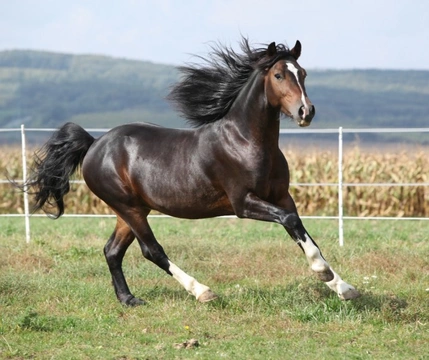
Keeping Your Horse Happy And Healthy
If you are thinking about buying your first horse then it is helpful to understand the basic requirements needed to keep a horse happy and healthy – if you already have a horse then you can review your arrangements and see if there are any areas you might be able to improve on.
Horses require several key things in their management to keep them happy and healthy and these include:-
Forage – this means hay or grass and is described as long fibre as opposed to short feed or hard feed which tends to be cereal based and are often fed to animals in hard work. Horses are designed to eat more or less continually and to move around as they do so; they will often graze or eat for 16 out of every 24 hours. It is important that the horse has access to fibre to chew for long periods of time, his teeth erupt continuously and are designed to be constantly grinding long fibre. Long periods of time spent without eating can cause irregular dental wear, colic or choke as the horse may bolt food when it is available and, stable vices such as weaving, box walking and cribbing which may then lead to the development of equine ulcers
Water – horses need constant access to clean, fresh water. Always change stable waters regularly even if they look clean as they can pick up odours and taint such as ammonia from the stable environment which will discourage the horse from drinking. Paddock waters need care and regularly cleaning as the containers can become quite dirty with debris from the field
Movement – horses are designed to move around regularly and so stable kept horses can often develop issues which are linked to immobility such as a slow gut or colic – mobility is essential for gut motility which is how the food passes through the small and large intestine and colic is generally more prevalent in stable-kept horses. Lack of turnout can cause stiffness in older horses and stable vices. Stable kept horses still need some time out of their boxes each day and this can be ridden exercise, loose schooling or time spent on a horse walker if access to pasture is limited
Companionship – horses are herd animals and very sociable and require the company of other horses either within the yard or out at grass. Your horse would like to graze with friends but even having other horses adjacent can be beneficial as they can reach each other over the fence. Horses spend time in the group interacting with one another and mutually grooming. It is important that there is provision made at pasture for disagreements and that the pecking order is respected; horses that don’t get on should be moved to different groups. If you put hay on the field during the winter then always make sure there are one or two extra piles over and above the number of horses and ensure there is access to shade for all the horses and that there aren’t one or two who are excluded from the field shelter
Shelter – shelter doesn’t have to involve a stable, it can mean a field shelter in the paddock or even protection offered by a hedge or a line of trees. Shelter is just as important in the summer months as the winter as horses can suffer quite badly from over exposure to the sun and irritation from flies and other biting insects
Grooming – grooming is essential to keep your horse’s coat and skin healthy and to maintain hygiene. It also forms an important part of the bond between owner and animal. Grooming is a great way to check your horse for small wounds or injuries which may otherwise go unnoticed particularly in the winter months, or any suspicious lumps or bumps. Grooming creates channels of communication between horse and handler and informs the relationship under saddle, it also makes horses easier to handle in other situations such as loading and travelling
Purpose – most horses like a job, it doesn’t have to be the most exciting job in the world and the challenge is often finding the right job for that particular animal. Not every horse has to work and some horses spend periods of time out of work due to illnesses or injury or are permanently retired and not always when they are old
Routine – horses are like children, they thrive on routine, it gives them security and makes them feel safe. Try and keep to a routine which is settled if not fixed although that is not always possible. Sudden changes to routine are often unavoidable but a happy, secure horse who is confident in his handler should be able to cope with changes in routine or location without undue stress
Exercise – not every horse needs exercise so young horses before they are backed and old, retired horses will not be ridden, however, all horses need to move around – movement is essential for good health
A good horse management routine will also include a regular cycle of treatment and input from vets and other horse care professionals and this involves:-
Dental review and treatment from a vet or qualified equine dentist
Routine vaccinations for Equine Flu and Tetanus
Routine worming or a worm count regime but some worming will still be required even if you use worm counts
Farriery attention which is needed anywhere from every 4 to every 8 weeks – if the horse is not shod, his feet will still need to be trimmed and re-balanced
Treatment from an equine osteopath, chiropractor or sports therapist for back and joint issues and mobility and to promote healthy movement
Regular saddle reviews to check the integrity of the saddle and to adjust the fit if required



